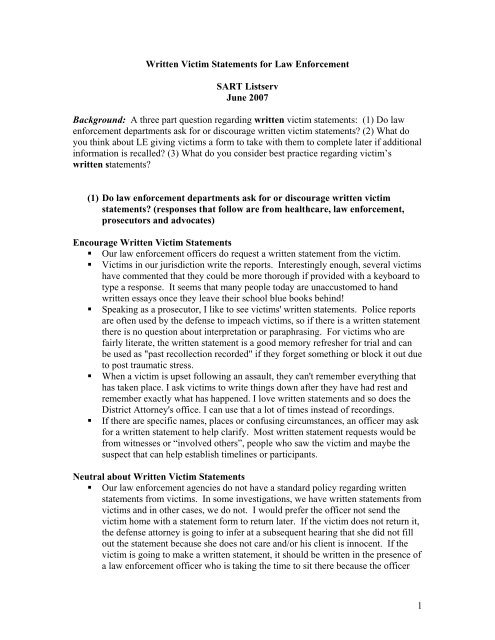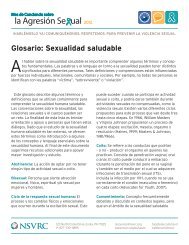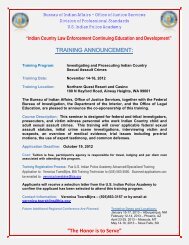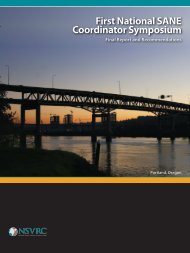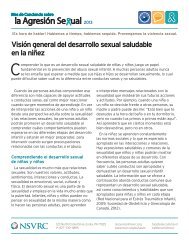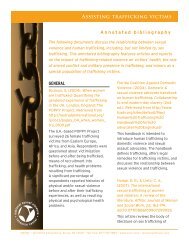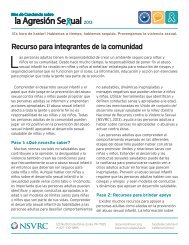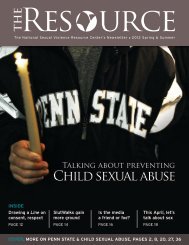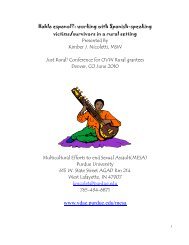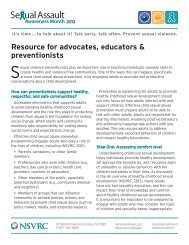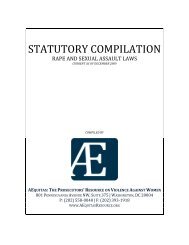Written Law Enforcement Statements (June 2007)
Written Law Enforcement Statements (June 2007)
Written Law Enforcement Statements (June 2007)
You also want an ePaper? Increase the reach of your titles
YUMPU automatically turns print PDFs into web optimized ePapers that Google loves.
<strong>Written</strong> Victim <strong>Statements</strong> for <strong>Law</strong> <strong>Enforcement</strong>SART Listserv<strong>June</strong> <strong>2007</strong>Background: A three part question regarding written victim statements: (1) Do lawenforcement departments ask for or discourage written victim statements? (2) What doyou think about LE giving victims a form to take with them to complete later if additionalinformation is recalled? (3) What do you consider best practice regarding victim’swritten statements?(1) Do law enforcement departments ask for or discourage written victimstatements? (responses that follow are from healthcare, law enforcement,prosecutors and advocates)Encourage <strong>Written</strong> Victim <strong>Statements</strong>• Our law enforcement officers do request a written statement from the victim.• Victims in our jurisdiction write the reports. Interestingly enough, several victimshave commented that they could be more thorough if provided with a keyboard totype a response. It seems that many people today are unaccustomed to handwritten essays once they leave their school blue books behind!• Speaking as a prosecutor, I like to see victims' written statements. Police reportsare often used by the defense to impeach victims, so if there is a written statementthere is no question about interpretation or paraphrasing. For victims who arefairly literate, the written statement is a good memory refresher for trial and canbe used as "past recollection recorded" if they forget something or block it out dueto post traumatic stress.• When a victim is upset following an assault, they can't remember everything thathas taken place. I ask victims to write things down after they have had rest andremember exactly what has happened. I love written statements and so does theDistrict Attorney's office. I can use that a lot of times instead of recordings.• If there are specific names, places or confusing circumstances, an officer may askfor a written statement to help clarify. Most written statement requests would befrom witnesses or “involved others”, people who saw the victim and maybe thesuspect that can help establish timelines or participants.Neutral about <strong>Written</strong> Victim <strong>Statements</strong>• Our law enforcement agencies do not have a standard policy regarding writtenstatements from victims. In some investigations, we have written statements fromvictims and in other cases, we do not. I would prefer the officer not send thevictim home with a statement form to return later. If the victim does not return it,the defense attorney is going to infer at a subsequent hearing that she did not fillout the statement because she does not care and/or his client is innocent. If thevictim is going to make a written statement, it should be written in the presence ofa law enforcement officer who is taking the time to sit there because the officer1
cares. The statement can be written at the victim’s home or at the policedepartment.• In our jurisdiction, I am not aware of any agencies, which have written policiesthat specifically describe the course of action an investigator/detective should takein investigating a sex crime. No departments discourage written victimstatements; depending upon the availability and/or willingness of the victim• The law enforcement departments neither encourage nor discourage writtenreports. They appreciate additional written statements. However, these mightcause problems in some situations. Inupiaq culture uses economy of words. Partof Inupiat Illutqusiat (traditional Inupiat values) is the avoidance of conflict. Bothconditions encourage our victims to be exceedingly terse in written explanations.Relying on a form and a report rather than human interaction is culturally veryEurocentric and could be detrimental to really finding out what happened.Discourage <strong>Written</strong> Victim <strong>Statements</strong>• Clients may not have writing skills or may have trouble organizing and writing anarrative - sometimes caused simply by the trauma and crisis. Clients may alsohave poor penmanship that makes a statement illegible. Unless a victim knowsthe elements of the law, s/he may neglect to record necessary elements (threats,pressure, and fear). Clients may also be uncomfortable writing a description of theincident and could use phrases like, “He did it to me.”• We have had several victims who wrote statements for the reporting officer andthen for a detective. Defense attorneys love it when the statements don’t “match”.• We have 11 tribes in Wisconsin and the practice of writing statements couldnegatively impact cases involving native victims. I am also concerned that thispractice would create additional barriers to other underserved populationsincluding (but not limited to) Hmong victims, Latina victims, African Americanvictims, elderly victims, victims for whom English is not their first language andvictims with disabilities. I also think it could have a negative impact on folks thatare illiterate or have poor writing skills. In my experience, some victims areashamed to admit that they can’t read or write or have a difficult time writing.Their reluctance or refusal to write out a statement could be misinterpreted. Whileit might be possible to only ask for statements from folks that fit a particularcriterion, I wonder how a policy that is not consistently applied to all victimswould be perceived by defense attorneys and the public.• I am more partial to taking the statement by audio tape or by having the officer,SANE or detective asking for detail and recording it themselves and askingadditional questions to get all the necessary information.• We prefer video recorded statements.• Are you are asking if victims in the SART process are asked to make a writtenversus an oral statement prior to the medical exam? If this is the case -absolutelynot. The law enforcement officer and the medical examiner conduct a thoroughand sensitive joint oral interview, which is audio-taped. We would not like to seeany written form used in a way that would encourage overworked orinexperienced officers to shortcut a good and sensitive interview.2
• I'm a former prosecutor/police officer, now professional trainer/advocate. Iwould discourage written victim statements at the initial investigative interview.This would create a written record in the victim's own words that will be used toimpeach the victim later. The impact of psychological trauma on providing anarrative history of the offense will be most evident in the early stages ofinvestigation (for most victims) and often leads to inaccuracies in offensechronology and omissions of important details (a symptom of PTSD and oftraumatic stress generally). The more vulnerable the victim psychologically, theworse this situation becomes. In addition, in the early stages of investigation theinvestigator can not usually establish sufficient repertoire for the victim todisclose negative facts about themselves or their actions, which are critical tomanage the prosecution. There is a limit to the extent that experts can cure this.• Inaccuracies are very, very distracting to juries who often need to view theevidence through a lens that makes the world safer than it is...• Giving a victim a form to take with them is a poor idea. You may give them aform that asks for their basic info such as name, date of birth, and current address.Each case is very specific and asking questions without being there to provide anexplanation of why the information is needed could be intimidating. I have seenforms that ask about the use of force, bondage, weapons, and the like. A victimmay be further traumatized by these questions, especially if they do not apply.Further, if the form has questions like “what clothes were you wearing” the victimmay feel they are not believed. People tend to communicate more thoroughly andeffectively in person. I think this particular crime is worthy of human touch.• We discourage asking for written statements. We consider it best practice to do athorough interview(s) and not rely on written statements. Our <strong>Law</strong> <strong>Enforcement</strong>Training Consultant explains it this way: The purpose of getting a statement is: todetermine if a crime was committed, where and by whom; to identify the detailsof the crime; to establish the elements of a crime(s), establish a timeline; toidentify what evidence might exist and where to locate that evidence; tocorroborate the victim’s allegations and to identify if there are any witnesses thatcould corroborate the victim’s statement. These reasons can come into conflictwhen you ask a person to write out a statement. Victims don’t know what theelements of crimes are, there is a lack of knowledge of what law enforcement andprosecutors need, lack of consistency and clarity in the language that many folksuse to describe sexual assault and specific acts, and the way a person writes astatement can add to the biases that victims already face when they are sexuallyassaulted. In addition, the impact of trauma can impact a written statement.• Victims may not be clear about the specifics of their assault(s). The writtenstatements of victims who remember additional details days, weeks, months oryears later could be used to impeach the victim. Also, some victims are notcompletely truthful when they initially report an assault. These deceptions are notalways done consciously and they don’t mean the assault did not happen.Sometimes victims do not disclose specifics of an assault to protect themselves.While this will have to be addressed regardless of what kind of statement is taken,I think that it can be much more difficult to undo or explain an inaccuracy orinconsistency in a written statement compared to an oral statement. Lastly, we3
have had experiences working with some officers who are either uncomfortableworking on sexual assault cases and interviewing folks or they don’t believevictims in general. (Note that this is by far not the majority of officers but enoughto be a concern for us.) Some of these officers could use written statements toscreen out cases and/or as a crutch so they don’t have to interview victims orinvestigate the allegations.• First, victims are not familiar with the elements we have to prove for rape. I’mafraid they would leave out crucial details or write something that could ruin thecase. Often the victim will say things such as “he tried to put his penis in me”when in fact there actually was penetration, but she does not understand the“penetration however slight” part of our statute. I can see defense attorneysgrilling the victim based on a written statement and any inconsistencies they canfind. It is important for the detective to do the interview, so that the facts andelements can be brought out. Victims often minimize the events and take on guiltfor the assault and that does not need to be memorialized in written form. Theother concern I have is if this form is to be given by patrol officers. My concernis that it will just be an excuse for the officer to do an incomplete preliminaryinvestigation. We already have problems with officers just giving a witnessstatement form to a witness and not interviewing the witness directly. If it is to begiven by the detective, I don’t see the point. We, as detectives, should be doingan in depth interview anyway. If the form is to be given by SANE/SART, theydon’t know the elements and legal issues that need to be addressed in the victiminterview and it also takes away from them being an unbiased evidence collectorand medical responder.• From an advocacy standpoint, our concern is that defense attorneys will welcomethis as a great tool to impeach victims. The written word carries great power in themainstream culture. Victims may not write well. Even those who do may be veryreluctant to write down everything... Sometimes investigators can’t even get tovillages for more than a day after being called. Asking for a written statement inadvance, unless the person is very much more comfortable writing than speaking(rare) could cause issues for reasons stated above. During the interview, the needfor an oral statement is clear. Producing something a while later might be helpful,but it also could produce apparent differences in story due to the difference in theinterview process.• During the "first" interview, the victim should not write their own statementwithout <strong>Law</strong> <strong>Enforcement</strong> and Advocate present because the victim may putinformation that would jeopardize the investigation or hurt them during the trial;the defense attorney could use that information against the victim(2) What do you think about LE giving victims a form to take with themto complete at a later date if additional information is recalled?4
Good Idea• Good idea, I suggest the victim keep a journal and share it with the detective- ifmore information is remembered. [Question re: the victim keeping a journal andsharing with the detective – does this material become part of the statement, andsubject to release to defense? There may be some concern if the journal,especially in its entirety, becomes open to defense counsel scrutiny].• I also like the idea of a form to take home for things remembered later. Ourvictims get hammered about not telling everything at the time of the firstinterview.• I think having a form with a list of things to describe could be helpful. Sometimesit takes weeks or months to recall things. I do request written statements so thatthe victims can jot down facts as soon as they can remember.• Having a form that the victim takes home for later completion will be helpful fortwo reasons. The first one being it will help the victim heal & let him/her know itis not their fault and the second may be after some time has gone by, the victimmight remember some small detail that will be helpful in the prosecution of thesuspect.• As a forensic examiner, I have often heard victims remembering small segmentsof their experience hours and days after the assault. Rare is the person who canrecount every detail of her/his assault in chronological order! It's a wonderfulidea to give the victim a form to take with her in case she does remember moredetails at a later time (which is very common!)• I do think it is useful to ask victims to keep a "log" of things that they rememberbetween interviews. The purpose of the log should be described both verbally andon the sheet of paper given to the victim. (We need to recognize that traumaswamps us cognitively, and we can't take in data or remember it in a "normative"way.) This is not a journal for feelings, thoughts, musings, anything related torecovery. This is the victim's shorthand list of details/events that are recalled thatare directly related to the offense. The victim should know that it would bedisclosed in discovery.Not Good Idea• No because we do follow-up interviews just for that purpose. In most cases, thevictim will remember other facts after giving initial statement.• I do not think that forms given to a victim to take home or complete at a later timeis a good idea. In fact, I think it is a bad idea and could potentially createdamaging Rosario material, which can be detrimental during trial. A victim’s pastexperiences are banned from being explored by the defense in sexual assault trialsand a form like this is an opportunity to open the door to questions, which couldotherwise be avoided. It is also an opportunity for the victim to talk with otherpeople and not contaminate the process with a statement with external thoughts orinformation.5
• As a prosecutor, there could be problems if victims are not good at writing andexpressing things on paper.• I think that we already ask victims to do a lot. This is one more piece of paper forthem to keep track of, fill out and send back. Victims in our state already receive alot of information about their rights, what to do if they are intimidated, who tocontact, information about safety etc. and it can be overwhelming. Additionally Ithink it lacks the personal connection that some victims feel helps them throughthe criminal justice process. I also don’t think you need to create a specific formfor this information. Victims should always be encouraged to contact lawenforcement if they remember additional details.(3) What do you consider best practice regarding victim’s writtenstatements?• Asking victims to write a statement giving as much detail as possible.• Best practice for statement writing is a huge discussion. But generally, a writtenstatement should focus on the assault itself and not stray from the assault unlessthere are extenuating circumstances which: lead to the assault, are important tothe identification of the defendant, explain confusing evidentiary findings, orotherwise clear up problems a reasonable person would have understanding theassault. Things such as time of day and what the victim was doing prior to or atthe time of the assault are good, but thoughts and feelings other than fear andpain are generally not good, unless they explain actions taken by the victimwhich seem difficult to understand.• Give the victim time to write - and explain precisely what is needed in thestatement. Read the statement out loud to them so they can make any correctionsor clarify their meaning.• Because victims may suffer from PTSD, it is a good thing to have an expertwitness to testify to the effect of trauma on a victim and to explain why they maynot have remembered everything all at once.• Best practice would be victims’ written logs to support the process of a case, toanalyze the offense in micro-detail and to scrutinize data available about theoffender.• Best practices include: (1) Handle with care. (2) Provide enough time and quietfor the victim to be reflective. (3) Have someone (an advocate) there for theirsupport. (4) Possibly have some way they don’t have to write it down themselves(transcription).(5) Use written forms on a case by case basis, -they must notreplace a good interview.• I think the best practice is to get a written statement a day or two after the crimehas been reported. <strong>Written</strong> or comprehensive interviews should never occurwhen the victim is intoxicated. They should be taken after some of the shock hasworn off and the victim can recall most of the details. The initial interview isimportant as far as demeanor, but victims generally do not recall all the details intheir first contact with a law enforcement officer. I see a lot of errors in my6
opinion in the interviews of sexual assault victims and more training andstandards need to be adopted and taught.• Best practice: anything taken will be added to the report as official record. Itfrequently takes victims time to process, so their first statement may not be veryaccurate. I would encourage them to give me their initial statement, and then askthem to keep a note pad and write down things as they are remembered. Asupplement can be added to a report with the additional information, simplystating that the victim, after having a few days, was able to recall otherstatements, events, or people.7


